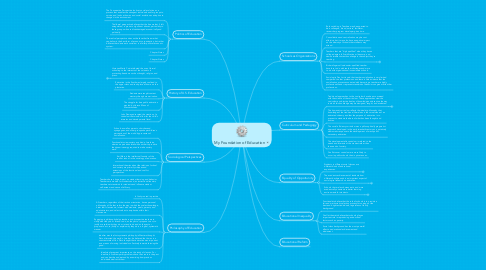My Foundation of Education
by Ronnie Driver


1. Politics of Education
1.1. The Conservative Perspective looks at social evolution as a process that enables the strongest individuals and/or groups to survive, and looks at human and social evolution as adaption to changes in the environment.
1.2. The liberal perspective believes that the free market, if left unregulated, is prone to significant abuses, particularly to those groups who are disadvantaged economically and politically.
1.3. The radical perspective does not believe that free market capitalism is the best form of economic organization, but rather believes that democratic socialism is a fairer political-economic system.
1.4. Chapter Notes
1.5. Chapter Notes
2. Philosophy of Education
2.1. Is firmly rooted in practice
2.2. All teachers, regardless of their action orientation, have a personal philosophy of life that colors the way in which they select knowledge; order their classrooms; interact with students, peers, parents, and administrators; and select values to emphasize within their classrooms.
2.3. Engaging in philosophy helps teachers and prospective teachers to clarify what they do or intend to do, as they act or propose to act, to justify or explain why they do or intend to do and as they act or propose to act, to justify or explain why they do in a logical, systematic manner
2.4. idealism was the first systematic philsophy in Western thought. Plato distrusted the world of matter; he believed that it was in a constant state of flux. Plato thought that education was important as a means of moving individuals collectively toward achieving the good.
2.5. Idealists place great importance on the study of classics. For idealists, all contemporary problems have their roots in the past and can best be understood by examining how previous individuals dealt with them.
3. Schools as Organizations
3.1. Role switching is Teachers may be expected to be a colleague, friend, nurture, facilitator, researcher, program developer given time.
3.2. Consolidation and centralization may be cost effective, but it may also have a negative impact on the diversity of schools that students may attend.
3.3. Teachers that are "high qualified" when they have a college degree, full certification or licensure, and demonstrable content knowledge in the subject they're teaching.
3.3.1. Included
3.3.2. Included
3.3.3. Excluded
3.4. Richard Ingersoll said under-qualified teacher have less to do with teacher shortages and more to do with organizational issues inside schools.
3.5. Sociologist Dan Lortie said that teacher socialization is very limited compared to other professions and there is little evidence that the socialization process associated with becoming a teacher are highly professionalized or represent standards of behavior congruent with other professions.
4. History of U.S. Education
4.1. Historian Merle Curti attributed the use of formal schooling to the interests of the colonists in protecting freedoms such as thought, religion, and press.
4.1.1. Project specifications
4.1.2. End User requirements
4.1.3. Action points sign-off
4.2. Education in the South was largely confined to the upper class and took place at home on the plantation.
4.3. Students were taught content mastery through memorization.
4.4. The struggle for free public education was led by Horace Mann of Massachusetts.
4.5. John Dewey advocated the creation of a curriculum that would allow for the child's interests and developmental level.
5. Sociological Perspectives
5.1. Schools-as well as parents, churches and synagogues, and other groups-shape children's perceptions of the world by processes of socialization.
5.2. Functionalists view society as a kind of machine, where one part articulates with another to produce the dynamic energy required to make society work.
5.3. Karl Marx is the intellectual founder of the conflict school in the sociology of education.
5.4. Interactional theories about the relation of school and society are primarily critiques and extensions of the functional and conflict perspectives.
5.5. Teachers have a huge impact on student learning and behavior. Teachers are models for students and, as instructional leaders, teachers set standards for students and influence student self-esteem and sense of efficacy.
6. Curriculum and Pedagogy
6.1. Traditional approaches to the curriculum have been concerned with the science of the curriculum. These approaches view the curriculum as objective bodies of knowledge and examine the way in which this knowledge may be designed, taught, and evaluated.
6.1.1. Materials
6.1.2. Personel
6.1.3. Services
6.1.4. Duration
6.2. The humanist curriculum reflects the idealist philosophy that knowledge of the traditional liberal arts is the cornerstone of an educated citizenry and that the purpose of education is to present to students the best of what has been thought and written.
6.3. The social efficiency curriculum was a philosophically pragmatist approach developed in the early twentieth century as a putatively democratic response to the development of mass public secondary education.
6.4. The developmentalist curriculum is related to the needs and interests of the student rather than the needs of society.
6.5. Conflicts over curriculum are more likely to occur in public schools than in private ones.
7. Equality of Opportunity
7.1. Students in different social classes ave different kinds of educational experiences.
7.1.1. Dependencies
7.1.2. Milestones
7.2. The academic achievement of students from different backgrounds is an important aspect of sociological research on education.
7.2.1. Schedule
7.2.2. Budget
7.3. Schools that are less bureaucratic and more academically oriented are better learning environments for students.
7.3.1. KPI's
